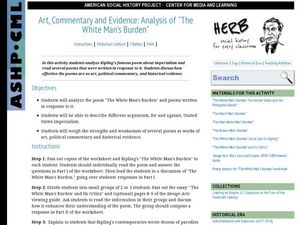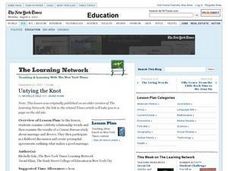Core Knowledge Foundation
Third Grade Skills Unit 4: Stories of Ancient Rome
A unit covering stories of Ancient Rome examines spelling rules, suffixes, verbs, quotation marks, writing, and dictionary skills. Lessons follow a similar routine; reading, skills practice, and extension activities, followed by...
Curated OER
Anonymous Sources in the Media
When do people ask for anonymity? Why? After reading the New York Times article "For a Reporter and a Source, Echoes of Broken Promise," young readers participate in a roundtable discussion focusing on freedom of the press and the use of...
Curated OER
Denial on Trial
What is the "Faurisson Affair”? What is “Holocaust Revisionism”? What does freedom of speech entail? Do revisionists have a right to voice their ideas? Such questions are at the heart of a richly detailed, thought provoking lesson...
Curated OER
Arti-Factual Evidence
Practice responding to controversial information with the New York Times lesson provided here. Middle schoolers watch a video interview with the director of The Lost Tomb of Jesus. After reading a companion article, they identify the...
Curated OER
Art, Commentary and Evidence: Analysis of "The White Man's Burden"
A cross-curricular activity combines poetry and history for your middle and high schoolers. The class critically examines Kipling's poem, "White Man's Burden" as historical evidence of the Imperialist ideology popular during his time....
Scholastic
Recovery From Drug Addiction
Are there factors that put some individuals at a higher risk for drug addiction than others? Learn more about the risk factors that may make some people more susceptible to addiction, as well as protective factors that help prevent...
Curated OER
Creature Seekers
Does it actually exist? Consider the sighting of a giant squid, much like the one that appears in 20,000 Leagues Under the Sea. Middle and high schoolers read the article One Legend Found, Many Still to Go, and research other mysterious...
Curated OER
Laughing Matters
Is laughter really the best medicine? Middle and high schoolers discuss the truth behind this adage by reading and discussing a New York Times article about Dr. Patch Adams. They participate in a round-table debate in response to...
Curated OER
Shame on You!
Should public humiliation be an acceptable consequence for a crime? Have your middle schoolers engage in a round table discussion about the recent resurgence of the use of public humiliation as a punishment for crimes in the United...
Curated OER
Expressing Your Views to the Letter
Analyze the motivation, purpose, and value of letters to the editor by examining letters written in response to the violence at Columbine High School. For homework, middle and high schoolers write their own letters to the editor about an...
Curated OER
Pig Products
How do you feel about cloning? This issue is highly debated, so educate your class before they participate in a similar debate! Read a New York Times article related to the use of cloned pig organs for human transplants. Groups develop...
Curated OER
Rave Reviews
A fun instructional activity that utilizes toys and persuasion! After reading the article, which was written in 2005, pull some advertisements for toys currently being sold. These will be more relevant to your middle and high schoolers....
Curated OER
"Take my Advice": Poems with a Voice
Discuss the meaning of the phrase tone of voice with the class. They respond to a variety of scenarios where a particular tone would be prevalent. They then read "Mother to Son" without knowing the title and answer some questions about...
Curated OER
What a Relief!
How are disasters addressed by the Federal Government? This New York Times lesson, based on the article "Disaster Aid: The Mix of Mercy and Politics," prompts middle schoolers to discuss the idea of using a disaster declaration as a...
Curated OER
What Makes a Good Law?
Why were laws created? Spark a group discussion on why we need laws to co-exist. Should the sale of some things be outlawed on Sundays? Read a case summary between Target and the state of Minnesota that debated this issue. Ask your...
Curated OER
Following the Leaders
Examine the historic election of Pope Benedict XVI and reflect on the challenges he faces as the new leader of the Catholic Church. This New York Times lesson investigates how other world leaders are chosen in different forms of...
Curated OER
The War of the Words
“Who’s This Guy Dylan Who’s Borrowing Lines From Henry Timrod?” The basic question in this lesson from the New York Time’s Learning Network is whether artists and authors who use the words of others are stealing from that artist or...
Curated OER
Untying the Knot
What are the current trends in divorce? What contributes to this? Examine celebrity relationship trends and how they relate to the general public with this discussion lesson plan. Middle schoolers analyze the results of a Census Bureau...
NPR
Civil Rights of Japanese-American Internees
Prompted by a viewing of Emiko and Chizu Omori’s Rabbit in the Moon, a documentary about the internment of Japanese-Americans during World War II, high schoolers examine a series of documents, including the Bill of Rights and the UN’s...
Curated OER
Lesson Exchange: Introduction to Research Papers (Senior, Literature)
Although unlikely in today's English classroom, this lesson focuses on introducing research papers to seniors in high school. It briefly reviews the parts of an essay, and mentions showing learners example essays, but no examples are...
Curated OER
Tracing The Origins of Autism: A Spectrum of New Studies
Has the occurrence of autism increased over the years, or do the changes in diagnostic criteria account for the difference? High schoolers read an article about autism spectrum disorders and the related epidemiological studies that have...
Curated OER
Vocabulary Building
Use primary text documents to learn word roots. Learners listen to a reading of the Declaration of Independence and highlight words they don't know. They compile these words and guess their meanings. They discuss roots, prefixes,...
Curated OER
Descriptive Writing Using the Book Rumpelstiltskin
Use the fairy tale Rumpelstiltskin to teach your third grade class about descriptive writing. Following a teacher read-aloud of the story, the class brainstorms a list of adjectives describing the main character. Students use this list...
Curated OER
Awesome Stories: Vincent van Gogh
Who was Vincent van Gogh? Most of the questions can be answered in two or three sentences; however, there is at least one essay prompt and one personal response question that require longer answers. Questions call for a good mix of...

























